The Elder Scrolls IV: Oblivion - Shivering Isles
Feverish anticipation.
If you're a publisher, how do you show off a game that's as open-ended and sprawlingly emergent as Elder Scrolls? If the journey's the thing, how do you compress a week-long cruise into a half-hour commute? Well, one way is to let people play it - to experience the trip for themselves. But the three hours that publisher 2K Games recently granted Eurogamer to play the new expansion, Shivering Isles, was never going to be enough to experience everything that developer Bethesda has managed to fit into such a rich and vast world.
"We wanted to do an expansion that took the best parts of what people experienced in Oblivion, but give them an entirely new setting that looked and felt very different from anything they did in Oblivion," says Pete Hines, Bethesda's vice president of PR and marketing. "So it's kind of more of the same but it's also completely different - we tried to focus on some of the different types of quest from Oblivion that people really seemed to gravitate towards, ones that had really good character, cool plot twists, that sort of thing. That was our goal. We had fewer NPCs that we had to deal with, so let's make them all a little deeper, better stories, and really make them all really memorable and interesting."
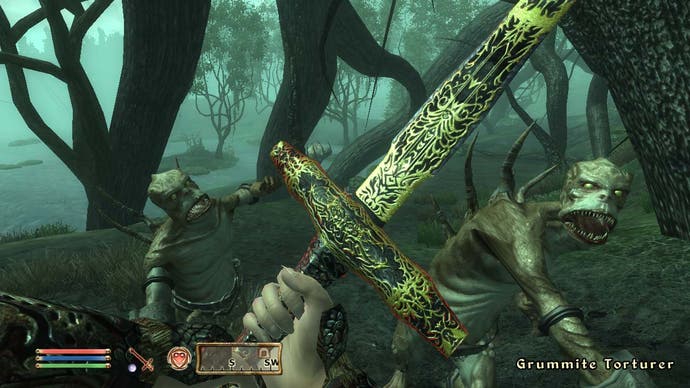
And let's put them in a massive environment called the Shivering Isles - or The Realm of Madness - ruled by a daedric prince called Sheogorath. It packs in ten new creature types (like the Flesh Atronachs and amphibious Grummites), 9,500 new lines of dialogue and two realms: the vibrantly coloured Mania, and the stark desolation of Dementia (embodied by two districts in the capital of the Shivering Isles: Bliss, and Crucible). And more emphasis on storytelling?
"Yeah, I definitely think so," agrees Hines. "You know, you've got this world of madness, this really compelling character Sheogorath, and two sides of his brain, two sides of this world in Mania and Dementia, which are both a stark contrast to Cyrodil and everything that you played in Oblivion as well as a stark contrast to each other. It's set up for really interesting characters and stories and things that you can do in the world - not just the main quest, but the miscellaneous stuff, there's some really great off-the-beaten-path stuff there to find that I think folks will really enjoy."
But perhaps we're getting ahead of ourselves. Eurogamer's three-hour play-through starts as the expansion starts, with the appearance of a mysterious portal in Niben Bay. Surrounded by a few deranged individuals. And that's basically the only visible change that the Shivering Isles expansion makes to the world of Oblivion: not the deranged individuals, but the portal, which you can pass through whenever you want. "So you can keep going doing whatever you want in Oblivion," explains Hines. "Or you can pass through the door and do Shivering Isles. You can play ten hours of Shivering Isles and go back through the door any time you want and go finish the Dark Brotherhood or the Thieves' Guild or whatever else you were doing. It's just completely seamless, it's just another location for you to go and do, and all of the stuff you find in Shivering Isles can come with you back to Oblivion."
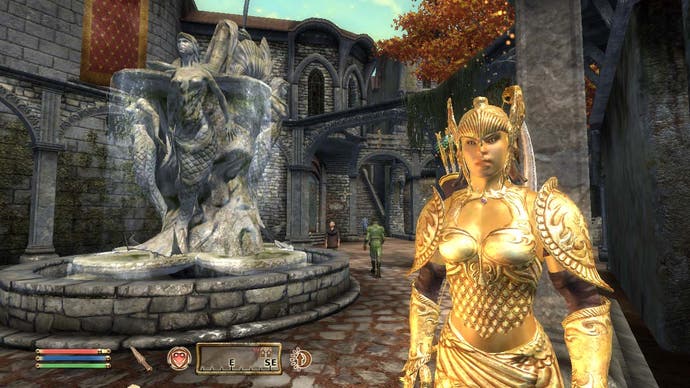
After leaving the nutters behind and stepping through the portal, your character is transported to a small room containing nothing but a chair, a desk, and a rather dandy chap called Haskill sitting on the other side of the desk. After sitting down, he makes a proposition (well, more of a suggestion, really): why not pass through the Gates of Madness to work for his boss, Lord Sheogorath, the God of Madness himself? Obviously, as with pretty much everything in Oblivion, you're free to turn it down. But, since that would make this a pretty short preview, it's probably best to agree. Suddenly, shafts of light spear through the walls as they transform into a swarm of butterflies and flutter away, revealing a landscape dotted with bizarre fungal outgrowths and unfamiliar flora.
Follow your nose and you'll soon find the village of Passwall, a small dwelling on the outskirts of the Gates of Madness, which contains your first real task: to somehow get past the giant, battle-scarred form of the Gatekeeper. Which provides a neat example of the way in which Shivering Isles preserves the open-ended, go-anywhere-do-anything philosophy of its Elder Scrolls brother, as Hines points out later, when asked about the size of the expansion: "In terms of hours? Well the world is a quarter the size of Oblivion, of Cyrodil. But it's always hard to gauge the number of hours because play styles are very different. That very first quest you did to get past the Gatekeeper, you can straight up fight him to defeat him, you can go get the tears of his mother, you can go get the help from Jayred and get the bone arrows. So you've got multiple different paths and how much time you spend getting ready for that gatekeeper fight is entirely up to you. And there's some other things like that in the world where you get to decide how you're going to accomplish a specific task."
So, um, sorry to be persistent, but how many hours? About 30 to 40? "Y'know, if you're the sort of person who jumped into Oblivion and roamed around and did whatever and found a dungeon and explored it, it could easily be higher than that. There's a gazillion new ingredients if you're into alchemy that you can find. So lots of free-form exploring and miscellaneous stuff that you can do, but at least a good 30 hours."
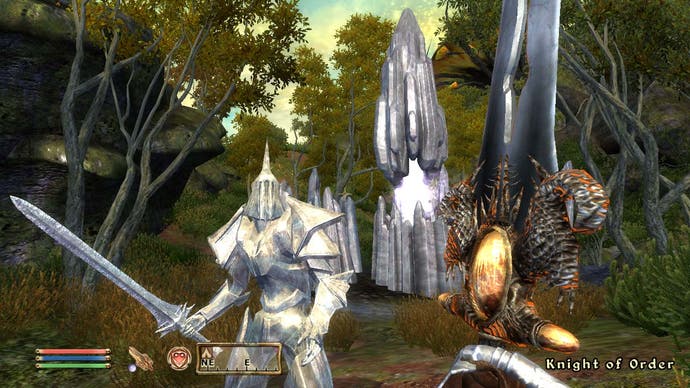
For a lot of that 30 hours, most players will no doubt want to follow the game's main quest, which sees you running a series of errands as Sheogorath's champion, in order to protect his lands from the Greymarch (whatever that is). Some of the highlights that turn up in Eurogamer's three-hour play-through include reconstructing the aforementioned Gatekeeper and turning the tables to toy with a party of adventurers in the dungeon of Xedilian. But as Hines points out, the Elder Scrolls series has always really been about 'the miscellaneous stuff'.
"The thing that I'm personally most pleased with," he says, "is that it really delivered well on this idea that you could create and tell your own story in the game. That you weren't forced down this linear path where if you played it for 20 hours and if I played it for 20 hours we'd pretty much have both done the same stuff. The fact that people were playing the game for long periods of time and doing completely different things and seeing things that somebody else had never seen or done is great, because we really wanted it to be driven by the individual. What kind of character do you want to play, what kind of stuff do you want to do in the game? If you don't care about the main quest then don't do it - who cares? Just go be a thief, or be a wizard, or be an assassin, whatever you want. I feel really good about having delivered on that experience and letting people define how they want to play the game."
There are a few neat things that Bethesda have done to provide new ways for people to play the game. There's the Museum of Oddities, for example, an Animal Crossing-style repository for any oddities that adventurers might find. And there are two new elements - madness ore and amber - that can be used by blacksmiths within the Shivering Isles to create new types of armour and weapons. And there are some fairly nifty new things to find, like Duskfang/Dawnfang. "It's a sword you get early on and every 12 hours it changes form from Duskfang to Dawnfang or vice versa," explains Hines. "And it counts how many lives you kill with it during that period, and if you kill 12 during any period then it becomes a more powerful version of itself. It's like it levels up, but just for that period - after 12 hours it reverts back to its other form and you start again. But I've noticed a lot of people really get into this sword that kills, like how many lives it's extinguished - they love getting that message 'Duskfang has extinguished 12 lives', they like that. So there's lots of little stuff like that in there."
And that - the little stuff like that - is really what made Oblivion so memorable; it'll probably be what will make Shivering Isles equally so.
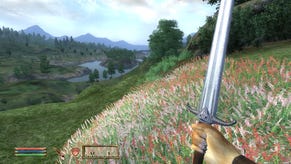
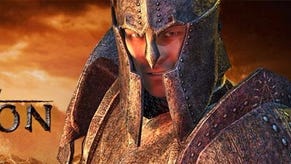
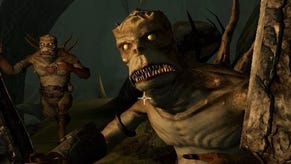
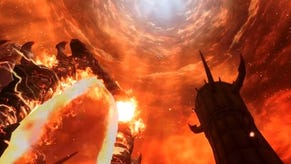




.png?width=291&height=164&fit=crop&quality=80&format=jpg&auto=webp)



